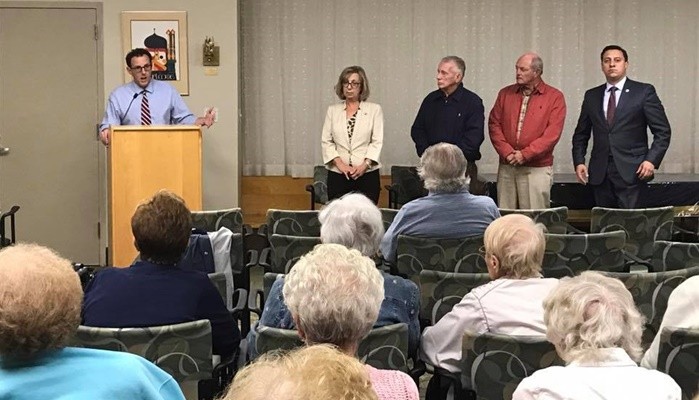Recently, Revere Mayor Brian M. Arrigo along with other city leaders launched an opposition campaign opposing a proposed slots parlor and hotel on Revere Beach Parkway near the Suffolk Downs racetrack.
After a group led by real estate developer Eugene McCain collected almost 5,000 signatures in an initiative petition process, city officials scheduled a special municipal election for October 18 at which time Revere voters will decide whether or not to approve the project. McCain’s group also collected nearly 100,000 signatures in June winning the right to have the statewide ballot question known as Question 1 placed before voters on November 8. Arrigo, who called the project “Little League,” urged voters to reject the proposal, saying it was poorly conceived and written, will not deliver on its promises, and is not the right fit for the Revere community. At a recent news conference regarding the situation, Arrigo said, “This isn’t about being pro- or anti-gaming. It’s about good and bad ideas,” and, “Look at the proponents’ shoddy proposal, look at their lack of a track record, and ask yourself if this meets the high standards that we have for our community,” according to The Boston Globe.
The mayor noted that so far, no elected official, including Governor Charlie Baker, has shown support for the project introduced by McCain. The international developer wants to build a 1,250-slot facility in the area around Suffolk Downs; however, a gambling license is not available under state law. The McCain-led petition drive in June seeks to amend Massachusetts law and lift the limit of casinos allowed in the state and allow a second slots-only license in a specific location. In order to prevent oversaturation of the market, only three casinos and one slots parlor, in separate defined geographic areas in the state, were legalized in the 2011 gambling law.
Earlier plans that would have turned the Suffolk Downs racetrack into a resort-style casino complex were approved twice by Revere voters, however, after being rejected first by voters in East Boston and then by the Massachusetts Gaming Commission, those plans were thwarted. Revere was bypassed by the latter in favor of the $1.6 billion Wynn Boston Harbor development in neighboring Everett.
A slots parlor in Revere would have to compete with the Wynn resort, which is just three miles from the site of McCain’s proposed slots-only facility. Arrigo stated in the lengthy statement that an example of the struggle a slots-only facility will face competing with a full-fledged casino located within close proximity is the Plainridge slot parlor in Plainville. Arrigo said, “Initial estimates suggested Plainridge could make $300 million in its first year of operation; as of April, it was on pace to make just over half of that estimate ($160 million). This is after going to great lengths to make up for a disappointing opening, including offering players up to $1,000 in free slot play,” and that, “There is simply no way a slot parlor located a few miles from a full-fledged resort casino will be able to deliver on its revenue promises,” according to the statement. The mayor’s statement names 14 city officials, including himself, that have joined against the slot casino.
Recently, MGM Resorts International, which is spending $950 million on its MGM Springfield casino, joined Wynn Resorts Limited in opposing the upcoming state-wide ballot initiative. And last week, McCain’s group announced that it hired Las Vegas-based casino developer and manager, Navegante, led by Larry J. Woolf, former president and CEO of MGM Grand in Las Vegas, to aid its effort to build the slots facility.


